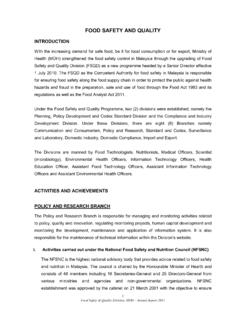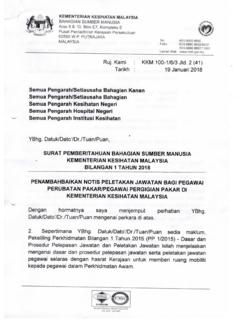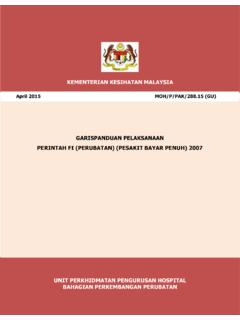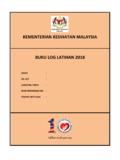Transcription of KEMENTERIAN KESIHATAN MALAYSIA …
1 MCS 1 KEMENTERIAN KESIHATAN MALAYSIA . MALAYSIAN CERTIFICATION SCHEME. FOR HAZARD ANALYSIS AND CRITICAL. CONTROL POINT. (1ST SEPTEMBER 2015). Copyright Food Safety and Quality Division, Ministry of Health MALAYSIA MCS 1 Table of Contents 1. INTRODUCTION .. 1. 2. DEFINITIONS. Adequacy audit .. 1. Audit .. 1. Auditor .. 1. 1. Non-conformance (NC) .. 1. 2. Minor .. 2. Major .. 2. 2. Corrective action request (CAR) .. 2. Checklist .. 2. Certification .. 2. Compliance .. 2. Compliance 3. Establishment .. 3. Follow-up audit .. 3. Food premises .. 3. HACCP Plan .. 3. On site-audit .. 3. Pre-requisite programmes (PRP) .. 3. Surveillance audit .. 3.
2 3. 4. 4. SCOPE .. 4. 5. BENEFITS .4. 6. GENERAL REQUIREMENTS FOR APPLICATION .. 4. 7. NEW CERTIFICATION .. 5. Application Process .. 5. MCS 1 Fees and auditor 5. 8. SURVEILLANCE .. 6. 9. RENEWAL OF CERTIFICATION .. 7. Application process .. 7. 8. 10. EVALUATION PROCESS .. 8. 11. VALIDITY OF THE CERTIFICATE .. 8. 12. REAPPLICATION OF NEW CERTIFICATION .. 9. 13. CERTIFICATION FOR ADDITIONAL PRODUCT(S) .. 9. Application Process .. 9. Fees and auditor 10. 14. APPEAL .. 11. 15. CONFIDENTIALITY .. 11. 16. OTHER 11. Application of HACCP Certification for Certified Premise with Different Premise Name .. 11. Change in Premise Name .. 11. Change in Products Name.
3 11. Application of GMP Certification for MOH HACCP Certified Premise .. 12. Loss/Damage of Certification .. 12. 17. WITHDRAWAL OF HACCP CERTIFICATION .. 12. 18. OTHER 13. 19. ENQUIRY..13. 4. 20. REFERENCES .. 14. MCS 1 1. INTRODUCTION. The Malaysian Certification Scheme for Hazard Analysis and Critical Control Point system (MCS HACCP) describes procedures which apply to food premises in gaining HACCP certification. The scheme is administered by the Ministry of Health (MOH), which requires the food premises to set up and implement a HACCP. system that meets the MCS HACCP criteria, followed by the application and granting of the certification.
4 The certification process includes adequacy, compliance and any follow-up audits by appointed a n d certified auditors. The MOH will verify the maintenance of the certified HACCP system through surveillance audit. The certification is granted for specific food product and is not a blanket certification for all types of food product w i t h i n a food premise. 2. DEFINITIONS. For the purpose of this scheme, the following definitions shall apply: Adequacy audit A desk-top/document audit to examine the contents of the HACCP Manual and supportive document submitted and to verify that all elements of the MCS HACCP. have been addressed. Audit An independent, systematic examination of objective evidence, performed by trained personnel, to determine whether the activities of the HACCP systems and the related results comply with planned arrangements and whether these arrangements are implemented effectively and are suitable to achieve food safety objectives.
5 Auditor A person formally appointed by MOH with technical competency in the HACCP. system and audit, including food processing technology. Conformance Conformance means a c t i v i t i e s a r e c a r r i e d o u t a c c o r d i n g t o t h e e s t a b l i s h e d procedures as laid out in the HACCP Plan and the PRP documents. Non-conformance (NC). Non-conformance means activities carried out are not in accordance to the established procedures. Categories of non-conformance are:- 1. MCS 1 Observation A recommendation given to affect an improvement. Minor A deviation of the HACCP-based system relative to HACCP procedures and facility sanitation or others which are not likely to reduce materially the facility's ability to meet acceptable sanitation requirements or ensure food safety.
6 Major A significant deviation from planned requirements MS1480, such that maintenance of safety is inhibited . Major non-conformance represents an unacceptable safety risk without constituting an overall system failure in the area concerned. Serious A severe deviation from planned requirements MS1480, such that maintenance of safety is impacted. Serious non-conformance represents a very significant omission or failure in the food safety system, one that has a direct and adverse effect on the safety of the product. Corrective action request (CAR). Non-conformances documented request by the auditor which must be satisfactorily addressed or corrected by the auditee.
7 All CARs must be closed before a recommendation for the HACCP Certification can be made. Checklist A list that contains points/elements that may be considered during assessment. It is used as aide-memoire to promote uniformity in assessment. Certification Procedure by which MOH as the officially recognized body provide written assurance that the food safety control and management systems conform to MCS. HACCP requirements Compliance Compliance means the HACCP plan and pre-requisites and their implementation meet MCS HACCP requirements. 2. MCS 1 Compliance audit An activity to obtain evidence that the seven HACCP principles have been effectively applied and the HACCP plan and pre-requisites correctly implemented and that the system can be maintained.
8 It includes adequacy, on-site and follow-up audits. Compliance audit is conducted by means of an independent, impartial and objective a u d i t t o a s c e r t a i n f u l l c o m p l i a n c e w i t h MCS HACCP. c r i t e r i a a n d requirements. Establishment Any premises comprising groups of people and facilities that are involved in the food preparation, processing, manufacturing, packaging, storage, transportation, distribution, handling or offering for sale or supply in any sector of the food chain. Follow-up audit The follow-up activity to obtain evidence that the non-conformances given as CAR. are being satisfactorily corrected and implemented and that the HACCP system has been maintained.
9 The follow-up audit can be on-site or document audit. Food premises Any building or factory used for or in connection with the preparation, preservation, packaging, storage, conveyance, distribution or sale of any food, or re-labelling, re- processing or re-packing or re-conditioning of any food. HACCP Plan A document describing the activities developed in accordance with the principles of HACCP to ensure control of hazards which are significant for food safety in the product under consideration and its intended use. On site-audit An audit that is conducted at the auditee's establishment. Pre-requisite programmes (PRP). PRP shall mean the universal steps or procedures that control the operational conditions within a food establishment allowing for environmental conditions that are favorable to the production of safe food as describe in the MS1480 or other related document.
10 Surveillance audit On-site audit of HACCP certified food premises by surveillance auditor(s) to verify the effective and continuous maintenance of HACCP system. Auditor expenditure 3. MCS 1 Auditor expenditure are including airfares, food, accommodation, mileage and other cost incurred by the auditor(s) for compliance and follow-up onsite auditing will be borne by the company. 3. OBJECTIVE. The objective of the scheme is to grant formal recognition to food establishment that have effectively implemented and maintained the HACCP system for their food product(s). 4. SCOPE. This guideline describes the requirements for food establishments to obtain and maintain the HACCP certification from MOH.

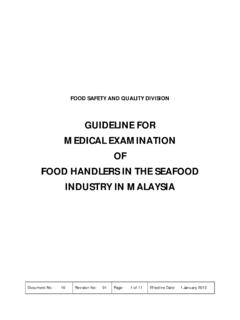


![FIRST SCHEDULE 162/88, 90/99,318/12] - …](/cache/preview/5/9/4/f/4/0/6/1/thumb-594f4061e61fbd66812936804bf1f548.jpg)
